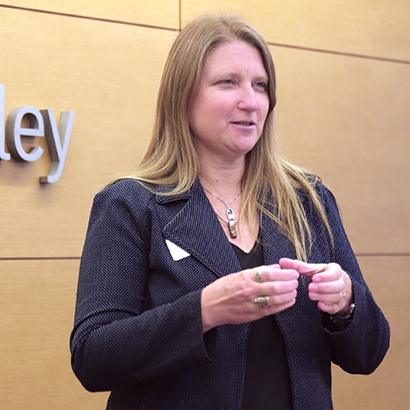This year's winning Strategy Challenge team offered tough but critical advice for a Brooklyn-based nonprofit seeking to offer its clients primary medical care.
In the heart of Brooklyn’s Bedford-Stuyvesant neighborhood, The Family Center, a nonprofit that supports families impacted by crisis, illness or loss, stands as a pillar of the community. As one client-turned-employee puts it, “Everyone is family here.”
Lately, the family had been thinking about growing. The nonprofit offers an array of much-needed social and legal services, including wellness and mental health treatment, to the 4,000-plus families it serves. But when an advisory committee made up of clients asked if primary medical care could be added to that list, co-founder and Executive Director Ivy Gamble Cobb saw an opportunity. “So many individuals who live in a community like ours get their care from emergency rooms,” she says. “And we saw that we might be able to offer integrated services for our families instead."
For help exploring that possibility, she and Deputy Executive Director and co-founder Jan Hudis turned for advice to Morgan Stanley, whose 10-week Strategy Challenge pro bono program matches nonprofits with rising talent within the firm to help solve key strategic issues. The four-member team assigned to lend its expertise to The Family Center included Maya Venkatraman, an Associate in Global Capital Markets, who found Gamble Cobb’s enthusiasm for the project infectious.
“Ivy and her team are so passionate about their cause. It gave us hope to know there are people like her out there trying to make the community better,” Venkatraman says, adding that her three teammates, Teresa Brady a Vice President in Legal and Compliance, Lili Driggs an Associate in the Fixed Income Division, and Shamir Parmar, a Vice President in Internal Audit, were just as eager to dive in.
Evaluating the Need
The challenge had complex roots. Numerous factors, including high costs, the complicated healthcare system and the lack of available Medicaid providers, all contributed to limiting the low-income community’s access to primary medical care. Might The Family Center either offer its own primary care service to fill this need or should it find and partner with another organization, its leadership asked the Morgan Stanley team.
Coming up with a recommendation in the allotted time frame would be no simple task. Guided by their advisor, Morgan Stanley’s Arya Sekhar, a Managing Director in Risk Management, and their coach, Peter Lavorini of the Bridgespan Group, the team interviewed individuals at more than 20 groups, including peer organizations and potential partners, as well as a range of other experts and consultants—from large medical centers, such as New York Presbyterian, to integrated care organizations, such as Apicha Community Health. “We were able to glean what worked and what didn’t and boiled that down to a set of best practices,” says Driggs.
The team also visited The Family Center's Bedford-Stuyvesant offices to witness staff members' interactions with clients. “We got a first-hand perspective on what they deal with daily, so that this was more than just about numbers and presentations. It was about people, about helping a community," says Venkatraman. “We really listened to them—about what they cared about—to get context for our analysis,” adds Brady.
When the Answer is No...For Now
At the end of the 10-week process, the Morgan Stanley team came to a consensus about The Family Center’s two strategic choices—although it wasn’t what they, or The Family Center’s leadership, had hoped for. Nor was it a recommendation that they relished presenting to the judges evaluating their results and those of eight other teams at the Strategy Challenge final event, after which a winner would be announced.
Still, after evaluating the data, the team members were disappointed to conclude that neither option was advisable. The Family Center, they concluded, didn’t have the resources to offer its own primary care, either on its own or by partnering with another organization. To execute such a vision, the nonprofit would have to overcome high overhead costs, low Medicaid reimbursement rates, complex regulatory issues and inadequate third-party funding—challenges that simply proved too big for the organization to overcome, without exposing itself to significant risk.
“It was a difficult message to have to deliver,” says Parmar. Adds Venkatraman, “The instinct is to say 'yes' and find a way to do it. But we realized saying 'no' would actually save them from going down a path that was not financially sustainable." And it was just this frank assessment that impressed the judges, who declared theirs the winning team.
The Silver Lining: A Framework for the Future
Despite the sobering recommendation from the Morgan Stanley team, the organization still feels that it came out ahead. That's because the team developed two tools that The Family Center can use to gauge its readiness to tackle this issue going forward. The first enables the organization to conduct a feasibility analysis if it wants to reconsider offering primary care in the future. The second lets the organization evaluate third-party partnerships—either for primary care or other needs. The team also identified a peer network that the nonprofit could leverage for expertise and mentorship.
“Organizations pay consultants tens of thousands of dollars for what we got from this 10-week engagement," says Gamble Cobb. “We received two tools I think of as my Bible now. We'll be using them for years to come."
Meanwhile, The Family Center's leadership hasn’t given up all hope of offering primary-care services in the future. “There's so much regulatory change going on in New York State as it relates to this issue. We'll see how things shake out," says Gamble Cobb, who says she is grateful to the Strategy Challenge team for keeping The Family Center from taking on a project it couldn't handle. “The best decision we ever made was to participate in the Challenge,” she says. “The team saved us from going down a path that could have led to the demise of the organization.”
As for the team members who worked with Cobb, winning the Strategy Challenge was all the more thrilling considering their outside-of-the-box final recommendation. “Our team was really focused on the impact we could have on the organization and the families they serve. It’s great that we were able to use the skills we learn in our jobs to help people who are bringing about change to the community,” says Venkatraman, adding that victory was “the icing on the cake."



